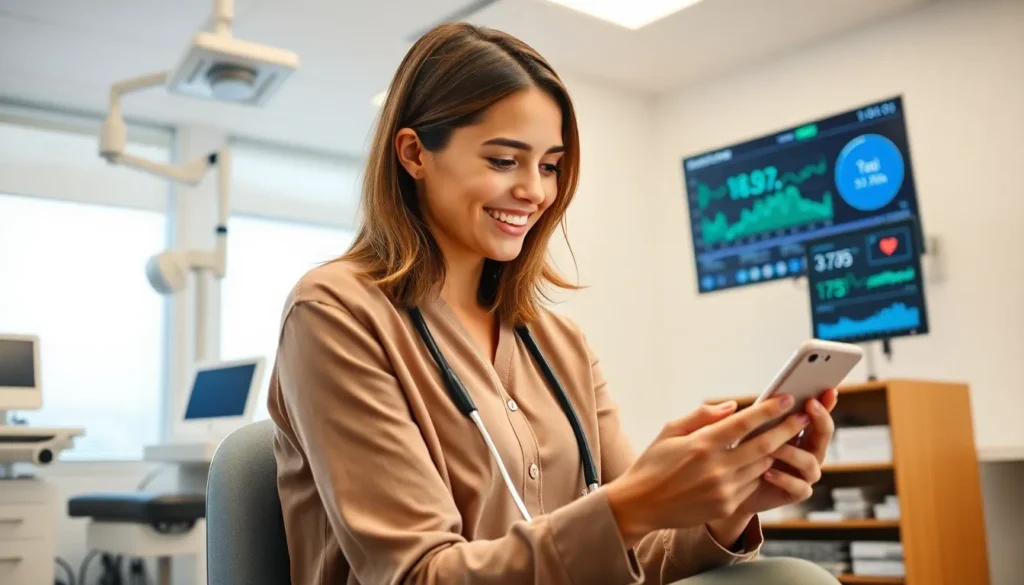In a world where everyone’s glued to their phones, it’s no surprise that healthcare’s jumping on the mobile app bandwagon. Gone are the days of waiting on hold for a doctor’s appointment or flipping through endless paperwork. Now, patients can access their health info faster than they can scroll through social media.
Table of Contents
ToggleOverview of Mobile Apps in Healthcare
Mobile apps in healthcare facilitate patient care and streamline medical processes. These applications enable users to access health data, manage appointments, and communicate with healthcare providers efficiently.
Definition and Purpose
Mobile apps in healthcare refer to software designed for smartphones and tablets that assist with various health-related tasks. They enable users to track fitness metrics, manage chronic diseases, and access medical records. Such apps aim to enhance patient engagement, improve health outcomes, and increase the efficiency of healthcare services. They connect patients with services and information, making healthcare more accessible and user-friendly.
Growth and Popularity
The growth of mobile apps in healthcare has surged, driven by increased smartphone usage and demand for real-time health management. A survey indicated that over 90% of consumers find mobile health apps beneficial. More than 50% of healthcare providers integrate these apps into their practices, enhancing patient experiences. Based on market analysis, the mobile health app market is projected to grow significantly, reaching a valuation of $236 billion by 2026. This trend showcases the rising reliance on technology for better health management and patient outcomes.
Types of Mobile Apps in Healthcare

Mobile apps in healthcare come in various forms, primarily focusing on enhancing patient and provider experiences. Below are the main types of apps.
Patient-Centric Apps
Patient-centric apps focus on individual user needs. These apps enable patients to access personal health records, schedule appointments, and track symptoms. Users can manage prescriptions and receive reminders for medication, which enhances adherence. Many patients enjoy using telehealth features in these apps to connect with providers directly and receive consultations from home. Convenience ranks high, as over 90% of consumers find these tools beneficial for health management. Such apps not only improve engagement but also empower users to take charge of their health.
Provider-Centric Apps
Provider-centric apps aim to streamline healthcare delivery for clinicians. These tools facilitate seamless communication with patients and improve access to health data during consultations. Providers can utilize these apps for coordinating care, managing schedules, and reducing administrative tasks. Many features include electronic health records integration and tools for sharing lab results efficiently. Over 50% of healthcare providers integrate mobile apps into their practice, indicating increased acceptance of digital solutions. Improved workflows through these apps contribute significantly to enhanced patient care.
Benefits of Mobile Apps in Healthcare
Mobile apps deliver significant advantages in the healthcare sector. They bolster the efficiency and effectiveness of patient and provider interactions.
Improved Patient Engagement
Engagement improves through the use of mobile healthcare apps. Patients can easily access their health information, which creates a sense of ownership over their health journey. Scheduling appointments becomes hassle-free, enhancing the likelihood of attending them. Tracking medications and symptoms empowers individuals to stay informed about their health status. Telehealth features allow for instant communication with healthcare providers, facilitating timely consultations. Consequently, this immediate access promotes a proactive approach to health management, resulting in better health outcomes.
Enhanced Data Access
Data accessibility transforms patient care. Mobile apps provide patients with on-demand access to personal health records, including lab results and treatment histories. Providers benefit from streamlined data sharing, ensuring up-to-date information during consultations. This real-time access reduces wait times and minimizes the risks associated with outdated information. With over 50% of healthcare providers adopting these technologies, enhanced data access supports informed decision-making. As a result, patients receive timely and relevant care tailored to their specific conditions.
Challenges and Limitations
Mobile apps in healthcare face significant challenges that can hinder their effectiveness. Key issues include privacy and security concerns, and regulatory compliance, which are crucial for maintaining trust and functionality.
Privacy and Security Concerns
Patient data privacy stands as a primary challenge in mobile healthcare applications. Apps often handle sensitive personal health information, making them attractive targets for cyberattacks. According to a 2021 study, 70% of healthcare organizations reported a data breach. These breaches can lead to legal repercussions and loss of patient trust. Furthermore, many users are unaware of how their data is stored and used, creating hesitation in app adoption. Securing data through encryption and adhering to best practices offers some protection, but technology evolves rapidly, necessitating ongoing vigilance.
Regulatory Compliance Issues
Navigating regulatory compliance represents another significant hurdle. Mobile healthcare apps must adhere to strict regulations such as the Health Insurance Portability and Accountability Act (HIPAA). Non-compliance can result in substantial fines and legal trouble. A 2022 analysis revealed that over 50% of mobile health apps lacked essential HIPAA compliance features. Ensuring adherence to these regulations poses challenges for developers, creating potential roadblocks to innovation. Regular audits and updates can aid compliance, but these measures require resources and strategic planning.
Future Trends in Mobile Healthcare Apps
Mobile healthcare apps are evolving rapidly, driven by technological advancements and changing patient needs. New trends are reshaping this landscape, enhancing user experiences and improving health outcomes.
Innovations in Technology
Emerging technologies are transforming mobile healthcare apps. Artificial intelligence enhances predictive analytics, leading to personalized health recommendations. Wearable devices are increasingly integrated, allowing real-time data collection. Blockchain technology improves data security and interoperability. Providers benefit significantly from augmented reality applications that assist in training and patient education. While these innovations elevate the capabilities of healthcare apps, their adoption requires careful consideration of user interface and accessibility.
Increasing Integration with Telehealth
Telehealth integration is becoming essential for mobile healthcare apps. A significant percentage of providers are now utilizing telehealth features to improve patient access. Enhanced communication facilitates seamless consultations and follow-ups, reducing wait times for patients. Remote monitoring tools enable healthcare professionals to track patient progress and intervene when necessary. Increased collaboration between patients and providers fosters a stronger relationship, boosting overall health management. Integration also streamlines billing and insurance processes, making healthcare more efficient and user-friendly.
Mobile apps are reshaping the healthcare landscape by enhancing patient engagement and streamlining care delivery. As technology continues to evolve the integration of these apps into daily health management is becoming indispensable. While challenges such as privacy concerns and regulatory compliance exist ongoing advancements promise to address these issues.
The future of mobile healthcare apps looks promising with innovations like artificial intelligence and telehealth features leading the way. By embracing these tools both patients and providers can expect a more efficient and effective healthcare experience. As reliance on mobile technology grows the potential for improved health outcomes becomes increasingly attainable.

